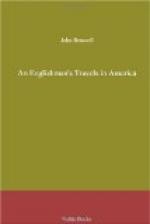As we proceeded, we kept a vigilant look-out for Indians, a number of whom, we had heard at Fort Andrews, had been driven in the direction we were travelling. We fortunately escaped molestation, but saw in several places human bones, probably the relics of a former combat between the United States troops, or travellers like ourselves, and Indians or negroes. One skull I picked up had been split with a tomahawk, besides having a bullet-hole in it about the region of the left ear. Our situation was one of great peril, but I had made up my mind to proceed at all hazards, despite the opposition shown by two or three of the settlers composing my escort, who, on more than one occasion, pointed out Indian camp-grounds of only a few days’ age. At one of these we found a quantity of Indian flour or arrowroot, part of a bridle, and the offal of a calf; but we left the former, imagining it might be poisoned, the latter was of no use, our only dog having been devoured by the wolves. Passing through a dense hammock, of a quarter of a mile in width, through which the pioneers of the American army had recently cut a rough road, I dismounted, to take a view of these sombre shades on either hand. The solemn stillness around seemed to me like the shadow of death—especially so, from the peril we were in through the deadly feud existing at the time between the Indians and white men. I penetrated for full a quarter of a mile into this fastness in a lateral direction, and, in doing so, suddenly startled two immense white birds of the adjutant species, which were standing in a swamp surrounded by majestic cedar trees. I could easily have brought one down with my rifle, but I thought it wanton cruelty to do so. They were, I should think, quite six feet high, and beautifully white, with a yellow tinge. The head of one, which, I suppose, was the male bird, was surmounted by a golden crest. They sailed quietly away over my head, not appearing much alarmed by the intrusion.
In these primeval shades, where, perhaps, the foot of man never before trod (for I looked in vain for such traces), are many beasts, birds, and reptiles, which live in perfect security; for, although the Indian dwells here, and subsists by hunting, yet the territory is so vast, and the red men are so few in proportion, that there can be little doubt that many places are untraversed.




